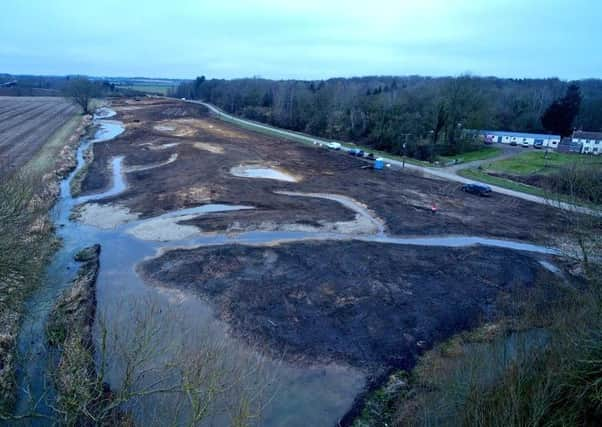Newly completed river restoration project near Sleaford hailed a success for wildlife


The improvements have been taking place on an important limestone beck near the village of Dunston and were recently completed in an effort to encourage local wildlife to thrive.
Work on the three-hectare site has turned a former arable field alongside Dunston Beck, downstream from the village, into a diverse floodplain and meadow habitat.
Advertisement
Hide AdAdvertisement
Hide AdThe work was led by the Wild Trout Trust and has involved collaboration between the landowner, Beeswax Dyson Farming Ltd, the Environment Agency, the Lincolnshire Rivers Trust and the Lincolnshire Wildlife Trust.
Not only will the project benefit fish species such as brown trout and aquatic plants and invertebrates, but the back channels and ponds will be great for bird species such as snipe, explain the project leaders.
Project manager for the Wild Trout Trust, Tim Jacklin said: “We’re delighted to have been involved in the development and delivery of this project along with our project partners. Creating more natural areas alongside our rivers and streams has so many benefits.
“As well as making them simply nicer places to be, it provides more space for water and better wildlife habitats, making our landscapes more resilient to climate change and boosting biodiversity. It will be great to see this site develop as the wildflower seeding and native planting becomes established.”
Advertisement
Hide AdAdvertisement
Hide AdEstate Surveyor for Beeswax Dyson Farming Limited, Joanna Knight, said: “This is a very important and exciting project for Beeswax Dyson Farming. It demonstrates forward thinking environmental land management at a time when agriculture is seeing significant change.
“We are very pleased to have collaborated with all the partners involved and the completed project is testament to the collective hard work.
“We now look forward to monitoring the wider environmental outcomes that this project will deliver and organising open days when social distancing rules allow, to engage with local residents.”
The Lincolnshire Limestone Becks are an important local habitat. Historically they have been supplied by consistent flows of high quality groundwater water from the Limestone aquifer. They are isolated and unique, and where in good condition, support a rich aquatic fauna and flora rarely found in Eastern England.
Advertisement
Hide AdAdvertisement
Hide AdAs with the other Lincolnshire Limestone Becks, from its source, the Dunston Beck would have historically meandered its way down from the higher ground of the Lincolnshire ridge to low lying fenland areas in the East, but had been straightened in places for land drainage and field boundaries. Habitat would have been varied with back channels, wetlands, clean gravel beds and pool and riffle sequences. This variation is vital in supporting an abundant and diverse range of wildlife but as with many of our watercourses in the UK, this has been lost due to historic alterations. This project has helped to restore an area of this lost habitat.
The Dunston Beck project is the latest in a series of collaborative restoration projects on the Limestone Becks which includes work led by the Lincolnshire Rivers Trust on the Branston and Scopwick Becks. If you are a landowner interested in this type of project, get in touch via lincsrivers.org.uk.